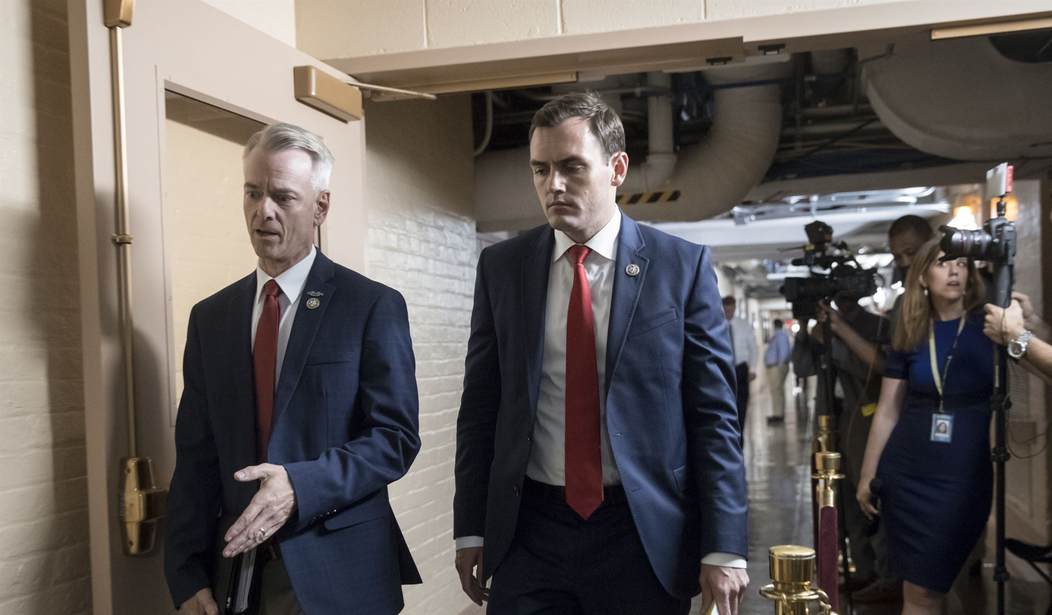Do you remember the “Problem Solver Caucus” from earlier this summer? That was the bipartisan group of members in the House who worked out some compromises on the $1.2 trillion dollar infrastructure bill and pieced together enough votes to make sure that the bill would pass after the Senate initially approved it. Or so they thought, anyway. Now that the reconciliation bill is tied up in knots in the Senate, a significant number of progressive Democrats are threatening to jump ship on the infrastructure bill, continuing to insist that they get both of them at the same time. So with prospects for getting anything to Joe Biden’s desk dimming, Nancy Pelosi may have to rely on the good graces of the House Republicans to get them over the finish line. Sadly for her, the Problem Solvers no longer seem quite as inclined to solve her problems. Several Republicans from that group who had initially indicated they would support it are now backing off and may be willing to let the Speaker go down with the ship. (Forbes)
As House progressives threaten to withhold dozens of votes to pass a bipartisan $1.2 trillion infrastructure bill if it comes up for a vote in the coming weeks, several Republican members of a bipartisan group that backed the bill say they have no plans to rescue it.
Two members of the Problem Solvers Caucus – Reps. Mike Gallagher (R-Wisc.) and Mike Bost (R-Ill.) – told Forbes they won’t vote for the bill, while another, Rep. Peter Meijer (R-Mich.), said he has a “tremendous amount of discomfort” with it.
Several caucus members and moderate Republicans said they are still undecided on the bill, and only two members of the caucus, Reps. Adam Kinzinger (R-Ill.) and Reps. Brian Fitzpatrick (R-Pa.), say they are supportive of it.
Mark Pocan (D-Wisc.) has been doing an unofficial whip count and he’s telling reporters that there are somewhere between 40 and 50 members of the Democrats’ Progressive Caucus who are willing to vote against the bill unless the Senate first passes the $3.5 trillion reconciliation bill. It’s the same demand the caucus has been making from the moment the infrastructure bill showed up in the House. And nobody seems to be budging.
There weren’t 40 Republicans in the Problem Solvers Caucus to begin with. They had more than enough to make up the difference if the “squad” boycotted the plan and possibly a few of their friends. But they weren’t anticipating as many as four dozen to bail out on the effort. And now they’re reportedly down to just two Republicans (Kinzinger and Fitzpatrick) who would still vote for it. At this point, why would any of the Republicans buck their own party and sign on for the $1.2 trillion package and have that on their record heading into their next primary race if the bill is just going to fail anyway?
Further, the numbers may be even worse for Pelosi than the estimate I noted above. Pramila Jayapal (D-Wash.) is the chair of the Progressive Caucus and she told reporters yesterday that she is “confident” that “a majority” of the caucus is ready to vote against it. If we’re being technical, that could mean anything from 49 to 96, but she sounds like it’s going to be somewhere closer to the upper end of that range. With Kevin McCarthy campaigning against the infrastructure bill, it’s tough to imagine finding that many more GOP members (on top of the members of the Problem Solvers) to jump ship.
So is that it? Has the ship already sailed? There is still a group of moderate Democrats who are insisting that the infrastructure bill be passed by itself before there’s any more talk of the reconciliation bill. That group includes Kurt Schrader of Oregon. On one of the Sunday shows this weekend, he said that if the vote on infrastructure was delayed, “I think you can kiss reconciliation goodbye.”
If that’s the case, you might want to pucker up. It’s less than a week until Pelosi’s self-imposed deadline of September 27 and it sounds like too many lines have already been drawn in the sand. The crazy part of all this is that we’re looking at a problem that is entirely of the Democrats’ own creation. They supposedly support both of these bills, but they could easily have gotten the smaller bill through. It’s only their “my way or the highway” attitude that is threatening to tank the entire deal now.








Join the conversation as a VIP Member